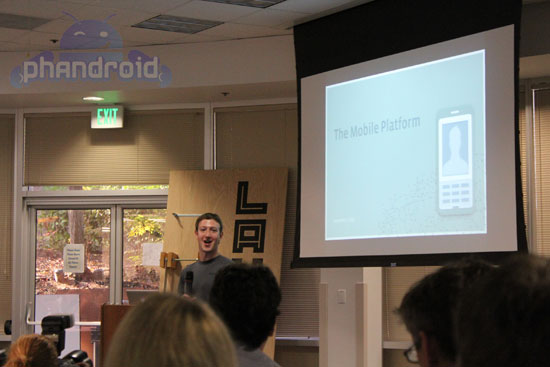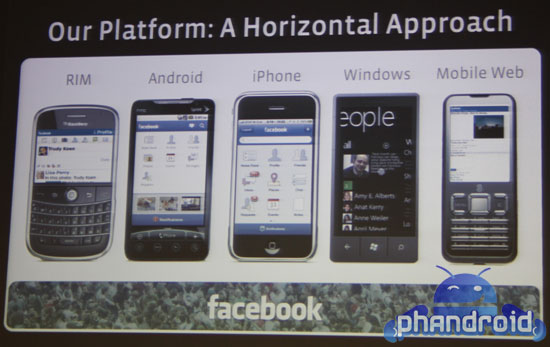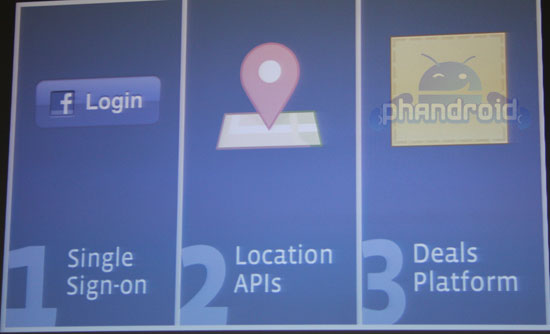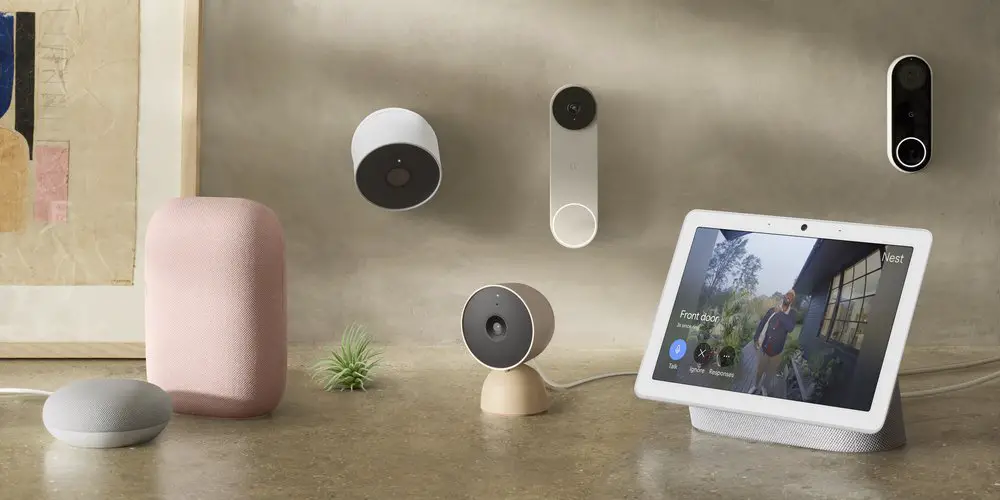If you think Facebook’s announcements of Single Sign-On, Places API and Deals Platform were a disappointment, you and I disagree, and I’ll tell you why. Grab a few Red Bulls, blast some Ronald Jenkees, and turn off your phone – I can’t be interrupted and I have some explaining to do.
Three years ago, Google held a mobile press conference in which everyone hoped they would announce the gPhone. They didn’t… they announced a mobile operating system. Today, Facebook held a mobile conference in which everyone hoped they would announce the Facebook phone. They didn’t… they announced/extended their “Facebook Mobile Platform”.

Just as the implications of Android were much bigger than a potential gPhone, Facebook’s mobile platform strategy is bigger than any Facebook phone could be. Not to mention, the announcement’s similarities to Android’s own announcement draw some striking similarities:
- Announcing Software vs. Hardware (and why it wins)
- Consumer Disappointment (and why it’s wrong)
- Empowering 3rd Parties (and creating leverage)
- Becoming A Threat (but overwhelmed by opportunity)
- Creating Momentum (and an Insurmountable Competitive Advantage)
Half of you already closed this article – too long. Half of the remaining half will close this article now – too wordy. But now that we’re saturated with the intellects and strategic thinkers in the crowd, I think it’s safe to continue (“meh” to those who read the headline and jump right to the comments). Let’s dive in:
Announcing Software vs. Hardware (And Why It Wins)
While Google and Facebook are very different companies, they aren’t that different. They’re software companies that empower their users with services. They’ve got a different set of services, but the bottom line is they are software companies that offer innovative, mass-market software solutions. Why would Facebook manufacturer a Facebook Phone? It’s outside of not only their core competency but also outside their mission.
Mark Zuckerberg addressed this in his opening statement today by saying [paraphrased], “Facebook is not going to build a phone. We want to empower social applications across all platforms. We don’t want to build applications, but instead platform components for people to build on top of moving forward.”

Can you read between the lines?
I heard that as, “We don’t want to sell one little phone. We want Facebook to dominate everything social in the universe and one phone won’t do that. So instead, we’re giving developers a social toolkit so they can make Facebook stuff and become our salesmen.”
Sound a bit like Android?
Google always professed that, “Android has no monetization strategy.” The goal was that by empowering people with smart and revolutionary mobile solutions, they would use the web more and that would be good for Google. If they could accelerate mobile innovation and smartphone adoption, they could expose more people to Google services, Google ads, and ultimately build new services that would take advantage of their current dominance. And inherently drive revenue (come on, they knew that).
Facebook doesn’t want to become the next MySpace. Building a phone does nothing to create a barrier to entry and it does nothing to further the social landscape which fruits they would then be able to enjoy. Let’s take a look at exactly what Facebook announced:

- Single Sign-On: Open an application and automatically enjoy the experience with access and perhaps pre-installed knowledge about you and your friends. Sounds a bit like signing into your Android phone with your G-Mail account and having your contacts, calendar, apps, etc… already at your fingertips and syncing up!
- Location APIs: If we know where you are and where you’ve been AND we know where your friends are and where they’ve been, there are some very interesting things Facebook can do from a social standpoint. Google tried some of them with Buzz and Latitude but weren’t that successful, but then again, Facebook is a company whose #1 strength is Social so perhaps they can do what Google did not. But oh yeah, they don’t have to… because app developers will do that for them… and then they enjoy the value added.
- Deals Platform: merchandising and couponing is an industry where big bucks reside. In reality, it’s a form of advertising. Both Google (with Adwords/Adsense) and Facebook (with Facebook Ads) know this is a fact. Google embeds ads in maps, apps and games but has the social significance of “deals” reached any type of nirvana let alone effectivness? Not reall. But Facebook is now using their vast social reach and location knowledge to create a marketplace where it can work. Or where 3rd parties can make it work and then they’ll enjoy the value added. Ms. Cleo Moment: think Facebook will eventually allow developers to embed location aware “deal ads” into their apps and games for a cut of the profit?
Their 3 announcements were big announcements, and they were big announcements because they were software driven rather than hardware driven. Which leads us to our next two points.
Consumer Disappointment
In the technically challenged PhanCast 25, Dave Demarest made this point blatantly obvious by asking, “How many people do you think closed the live stream right when they said there was no Facebook phone?”
Unfortunately, software isn’t as sexy as hardware. Having that high powered, sleek looking handset with outrageous specs is what gets the bulk of people excited. When Android was first announced, it was applauded by only a few. The majority seemed to think it was uninteresting and hopeless. Thankfully these aren’t the people tasked with creating innovative tech companies.
For the first year after Android was announced, nothing too exciting happened beyond the Android Developers Challenge. There were weeks that went by without a morsel of Android news. When Android was announced the fanfare was few and far between but it inevitably had a humongous impact. This Facebook announcement is the same. While you might not appreciate it now being the consumer driven bloke you are, a year down the road you’ll look back and think, “wow they are smart.”
Trust me on that one.
Consumers often can’t appreciate the long-term strategy and business leverage of such initiatives. Consumers want something and they want it now. That’s the crazy thing about the type of innovation that has made Facebook and Google so successful: they’re building the things you want before you know you want them. And once you have them, they’ll be things you don’t want to live without.
Empowering 3rd Parties (and Creating Leverage)
Some people might ask, why doesn’t Facebook just create their own home brewed solutions and apps and reap all the benefits themselves? There are two reasons for that:
- Facebook can’t be everywhere at all times, pursuing every opportunity they uncover
- Facebook isn’t ignorant enough to think they will always have the ideas that unlock social mobile awesomeness – the world DOES have some pretty smart people beyond their own employees
Now, instead of Facebook going it alone to create the perfect solutions, they’ve got a world of developers all “working for them” – for free – to make Facebook’s social and mobile platform infinitely successful. Android is no different. Every time another app or game lands on Android Market, Google has provided consumers with value. All they did was create the initial tools, and now thousands and thousands of people are out there building value for their product.
When MySpace was on top of the world you had to think, “How will anyone compete with them? Everyone has MySpace. Why would someone sign up with a social site that their friends aren’t on?” But people did, and now MySpace is more like UsedToBeMySpaceButIDeletedIt. New sites like Twitter and FourSquare proved that at any given time a new idea, opportunity, concept or hype can grab ahold of the world and reach that pivotal tipping point.
Facebook doesn’t want to become the next MySpace, so rather than enjoy complacency, they’re engineering layers of socially competitive advantage that will shield them from competition.
Think about Android. When Android phones first started launching, the odds were stacked against it with iOS, BlackBerry, WebOS, Windows Mobile, Symbian, and others. Now they’ve got a level of growth that is unmatched and a competitive advantage that seems like nobody can or will take them down. Regardless of what else is announced.
Facebook is a juggernaut but I would argue they still haven’t created a competitive advantage that makes them untouchable. The three announcements today are the catalyst which will propel them into that untouchable realm and for the same reason that Android was able to gain traction and dominance so early.
Opportunity. Google built an amazing mobile platform and let everyone in the world benefit from it:
- Hey manufacturers and carriers, want an amazing mobile OS with thousands of apps? Here ya go. On the house. And feel free to do whatever you want with it. Not to mention we’ll keep it updated and new apps/games will keep pouring in daily.
- Hey developer, want to create an amazing mobile application or game with the ability to reach millions of people and make loads of money? Here, have these awesomely open tools, go create it, and get rich.
Not everyone gets rich. We know that. But Android provided an equal opportunity for every developer on the planet to build an innovative app/game, offer it to the world, and enjoy limitless success. As Zuckerberg said today:
“Social is as big as mobile. Combine the two and you’ve got some huge opportunities for businesses to be created and industries to be disrupted”
The interesting thing is that mobile is inherently social; afterall, before all these apps it was used to talk to people with your voice. And social is inherently mobile too: you don’t only want to be connected to people while you’re at your desk at work, you want to talk to them when you’re out in the world, doing the things you love, and have something to say or something to share.
Facebook’s commitment to mobile is what will solidify their social dominance.
Becoming A Threat (but overwhelmed by opportunity)
Facebook’s Mobile Platform intends to empower developers to create the next generation of mobile applications, games and integrations. They’re empowering 3rd parties to build this next generation by leveraging Facebook, and so Facebook has wedged themselves into a position where the revolution depends on Facebook itself. That’s not smart… that’s genius.
But therein lies the dilemma: in the same sentence, Zuckerberg mentioned “opportunities for businesses” and “industry disruption”. Both of those phrases can apply to a singular company. Unfortunately, some won’t view this announcement as Facebook empowering them with opportunity, but instead imposing them with a no-option threat that levels the playing field and opens the door to competition.
I overheard one of Facebook’s mobile partners today when they were asked how they felt about the announcement, “Well it will definitely open doors… but to a lot of other people too. This is also a big threat to us. We’ve got to rethink our business.”
And it comes full-circle with Android.
Before any Android phone launched, many thought Google had no chance to break ground in the mobile market. It was dominated by industry legacies that wouldn’t budge to Google’s idealistic bullying. You can’t just come into a mature market, re-imagine it’s existence, and rearrange everything how you would like. Unless of course you’re as big as Google and have the perfect idea to go along with it.
I knew it all along… if even ONE of those carriers or manufacturers budged, the ball would have been rolled and as momentum gained, the rest would have no choice but to follow. And that’s exactly what happened. T-Mobile and HTC were the industry underdogs and immediately embraced Android to develop a competitive advantage. The others could either have their shot at Android or standby and watch T-Mobile and HTC eat up their market share. Once Verizon came around, Motorola pulled a 180, and AT&T jumped on board, there was no stopping Android. There was no turning back.
Right now Facebook’s Mobile Platform is at the “Big deal everything is practically the same” phase. But it won’t be that way for long. Existing companies and aspiring individuals will fully embrace Facebook’s APIs to create awesome applications that become household names. A large part of their success will come from the deep integration with Facebook. At some point, others will have no choice but to incorporate Facebook or enjoy limited limelight.
At least that’s what would happen in Facebook’s ideal world. I think that’s a little excessive in this particular scenario, but the concept still stands.
In the best case scenario, Facebook could notice how great your application is, buy out your company and swallow it up as part of Facebook’s core services. That’s a great exit strategy. But in the worst case scenario, Facebook could see what you’re doing, realize what a great idea it is, and build their own version of your app. Ouch.
It’s a threat and it’s an opportunity, but if others are leveraging Facebook’s APIs and tools, many won’t have a choice but to embrace the movement. And recognize the cost in allowing Facebook to be a middle man in your app experience – they’ll be collecting invaluable data about the apps user’s and the app’s users friends that help them continually build a better product, better algo, better service, etc…
Creating Momentum (and an Insurmountable Competitive Advantage)
At this point there isn’t a lot to say that hasn’t been said. If the above pieces all fall into place, the proverbial snowball will have been pushed down the hill. Facebook will have wedged themselves permanently into the social fabric of everything mobile and prevented themselves from becoming the next MySpace.
Think back a few years. At one point, Google was just a search company. Do you think they didn’t know that? While their algorithm was of tremendous value, it isn’t like they were untouchable. Hopefuls like Cuil entered the scene and Microsoft and Yahoo talked merger. While it wasn’t likely, it isn’t impossible to think that some enterprising person or company could come along with a really innovative and smart approach at search, capture the attention of the masses, and compete if not overtake Google on their home ground.
In a lot of ways, timing is everything. As Zuckerberg pointed out, mobile and social go hand in hand. Google had the perfect timing with Android and now it seems like their dominance in tech has reached the untouchable level. In many ways, Google’s success with mobile has paved the way for Facebook to combine the two and become untouchables themselves.
Both will have accomplished this with software rather than hardware. Both will have accomplished this with little fanfare upon announcement, but eventual momentum, wedging them into the fabric of mobile. Both will have accomplished this by building a foundation, leveraging their reach, empowering 3rd parties, and riding the wave created by the fruits of their labor.
Some may say both Google and Facebook have been untouchable for some time, but every great empire eventually falls. In fact, Google and Yahoo had so supplant what some may call untouchables in order to gain favor int he first place. In my mind, today was another step to ensuring Facebook won’t be falling, or faltering, any time soon.









Longest article i’ve seen around here.
Facebook = Android? LOL
TLDR
JK :) Well thought out, and I agree completely. I think a single phone is very short term oriented, and the reference to MySpace is not lost in that idea.
I skipped straight to the comments!
I still think it will fail.
A savvy and thoughtful analysis. In my white paper “Revolutionary Technologies” (http://www.scribd.com/doc/17271137/A-Model-for-Determining-Revolutionary-Technologies) I talk about how creating a platform is a critical component to being revolutionary — vs. merely disruptive or innovative.
I think what was not said here is just as important as what was said: That Apple is a product/device company (http://blog.capitalddesign.com/2010/08/21/apple-is-not-a-technology-company/), not a technology/platform/software company, which inherently limits their ability to dominate any serious computing sector. They are designed to be niche, and their approaches are self-limiting long-term, and quite remarkable and trend-setting short-term.
In future analysis articles, I’d recommend skipping the presumptions of what readers want to read and will skip… and just get right to what you want to say.
A thought: you might want to label these more thoughtful posts with some kind of title tag like “ANALYSIS: Topic” so those who just want the latest android news can skip it, while we strategic folk can just dive in without having to have to read the caveats.
Excellent Article, well written. It is nice to see an Android blogger take pride in original work.
Another thing I read between the lines on that “Horizontal Approach” shot: No Palm. xD
so…..uh…huh?
I don’t think it will fail… I HOPE it fail.
Android G1 > Facebook1
Android FTW!
Posted from my BlackBerry
Lol
That was a very well thought out article, Rob. I dont think it will be making any impact on my OS of choice though, Im not a facebook addict as some peoeple are so, anything other than using it for messaging is a waste of time for me. And my Evo allows me to do that just fine :)
Sounds like a lot of hoopla.
Too long, you lost me after the first paragraph :P
WHy the heck would i want a Facebook phone..the most retarded idea ever…
I think if you dig deep enough into Facebooks pockets you will find a ton of apples money. Keeping there phone a top priority at all times. There app remains so much more better its not funny
I dont really like where Facebook is going. Good for them. HORRIBLE for privacy! And why do we need yet ANOTHER OS? Especially one from FB? Do we really want to know that much about each other? And I’m not comfortable with people/ companies being able to track where I am, what I’m doing, who I’m doing it with, what I’m buying… the list goes on and on! Ok I’m not so naive as to think people can’t track that already, but all I can picture is the movie “Idiocracy”.
I survived the long article! You should make shirts for those that do. lol
.
Interesting read actually, thanks! One day we’ll think back and say: “You know, that Rob Jackson had made some pretty good points in that Phandroid article several years ago.”
Why is everyone ragging on this article. It makes sense. They already made the Facebook for Android app alot better today with improving the notification system and adding Places. Why would they try to get greedy and make they’re own phone? Why not try to make everyone who uses facebook on there phone better instead of focusing on one thing. Its like asking Angry Birds to make a phone instead of giving support to everyone. Long term ideas for an established company is needed.
Maybe the iPhone is easier to develope for, their apps always look sexy…
awsome read really gives a perspective of where the company is heading.
I can see were the single login is huge. I’ve gone to many websites and want to comment on an article. I’ve seen an option to create an account or comment using my Facebook account. It is so easy to click the button to comment to use my Facebook account to comment. Just today I went to a website and wanted to comment on an article. I clicked on the button to use my Facebook account. Not only was I able to leave my comment, but I also have an account on that site tied to my Facebook account. Now what Facebook will have to provide for us is a central location to list all the websites that are linked to our Facebook account and to delete the link.
A reverse philosophy was AOL and MSN and other instant messengers, that had a habit of every so often changing their protocols to keep people who may have had alternate applications (usually because of an alternate OS) from connecting..
You were right about what Facebook would announce. Your predictions sound plausible. This issue concerns me. Facebook makes me uncomfortable and these new features and services makes matters much worse.
I have really tried to understand what Facebook is announcing and why it matters, but I just don’t get it.
“Single Sign-On…. Sounds a bit like signing into your Android phone with your G-Mail account”
That makes sense for Google because they have multiple products, but Facebook has 1 product, Facebook. What else would I want to use my Facebook account for? I know I CAN use it to comment on some websites, but why would I want to do that?
“Location APIs: If we know where you are and where you’ve been AND we know where your friends are and where they’ve been, there are some very interesting things Facebook can do from a social standpoint.”
Why would Facebook know any of that? Are you taking about “Checking In” on Places? There is no benefit to doing that, so no one does it. If there is a benefit, please explain it to me, because none of my friends feel a need to do it and neither do I.
I can easily explain to someone the benefits of Android over a dumbphone, but I’ve yet to hear anyone explain the benefit of what Facebook announced.
You keep using the terms like “Leveraging Facebook”. What does that mean? Posting the high score of a game to my Facebook wall? Why does that matter?
In the end, both Google and Facebook aren’t selling phones to people. They are selling eyeballs to advertisers. The platform is a means to an end.
That’s where they differ from Apple. Apple really is selling the “thing”, the hardware and the software.
Very very interesting. I can’t believe some people are still complaining about the Facebook phone since the whole point of the article is that there isn’t one, and that is why Facebook is so clever. I loved the comparisons to the emergence of Android as a power house. T’will be interesting to see what happens!
1. Best of luck, sounds good and I hope you succeed.
2&3. I predict a massive FAIL! Here’s the deal. It seems like 2&3 are very closely related, and both heavily reliant on location awareness. Half the population is women and they are, to a person, very protective of their location. They don’t want stalkers, and we are getting into feelings here…but they don’t have any reason to trust facebook with that info or even trust their own ability to manage it to protect themselves. The other half of the population is Men, and they too don’t like to have their location monitored…”you were at the ____, again!!!??? (insert – bar, golf course, ex-girlfriend’s, fishing, etc.) How many of us guys want to hear that?
IMO, location-based awareness is a fail. People don’t trust it, and they don’t want to reveal it. In some sense, it is too bad, because instead of having information/deals/coupons driven to us, we have to go out there and search for it. But I truely believe people don’t want to give up their privacy to the degree necessary for this to succeed.
I think we are living in a social bubble just like in dotcom bubble. My guess is social bubble will burst in two years and only very few social companies or social business models will remain.
Nice article Rob…I agree with you 100%.
Social networking is not going away. People want to share their lives with their family and friends (god knows…some share WAY too much LOL).
Twitter is complicated for many people…I still can’t figure it out and most of my Facebook friends don’t use twitter. I only use twitter to follow others that announce new things dropping for Android and I just can’t get myself “into” it.
Myspace is dead (never used it…so I’m not sure why it really fell on its face). LinkedIn is primarily for business networking. SOMEONE will drive this family/friend geared social platform further and Facebook is definitely the likely choice at this time. I think they are simply realizing and seizing their permanent place in the mobile/social revolution.
What does all of this mean to us now? Not sure really…but Rob’s right…a year or two for now, you will most likely will not want to be without “it”.
…I would have loved to see a Facebook phone though. I had an image of what that would have looked like and I was already preparing to make fun of it!
idk.. i’m over facebook. i want it to go away, but it doesn’t seem that way.
I will join the commentors who agree with the analysis in the article; it’s spot on. A facebook phone would be nothing more than a gimic, but facebook as a platform … is a dystopian future that I would be some money on materializing.
I might seem wierd to some that I’m more or less OK with Google having tons of personal data about me, but I’m less OK with facebook having, but it’s a different kind of information. To google I’m an ip address or cookie id that views certain kinds of websites. They don’t care what my name is.
But facebook has my name, my picture and my friends, and their pictures, and this makes me very uncomfortable. And I’m afraid that one day, there’s going to be a have vs. have-not gap between those who are essentially willing to abandon all privacy and those who want to cling to some sort of divide between public and private life.
Very good read. I agree with everything you said..
Theres only one problem. Facebooks app platform while very accessible is pretty terrible unless you want to be an integrator only. If you want to brand your app, its a terrible fail. And you have to throw out Zynga, they dont really count, 99 percent of app developers will never see anything close to that success nor will they invest that kind of money in getting there. And zynga made their money through their own payment system, which is pretty unique to their game model.
1) Ever try searching for apps on facebook? Its a terrible fail. Having had apps on facebook and not been able to even find them using the search is a pretty huge insult.
2) There is no FB app store
3) FB has no direct channel for marketing applications. If you want to market your app you have to stand in line and buy the same ads as everyone else,
4) FB has no monetization strategy for app developers. Can I charge users to use my app? No.
5) FB does not market apps to its users. Most users simply dont use them, if they even know they exist. Which is usually luck or a friends referral.
6) FB apps have the rep they have with users because they are just above the level of spam most of them. They are an annoyance.
So its great that FB wants to be on every phone. I believe they will do a phone at some point. They would be insane not to when all it takes is a call to china and some drawings. Its not that hard to crap out a phone just ask google.
And I for one would probably buy it.
Im not disappointed with FBs announcement they wont build a phone. But I also dont believe it entirely, and I think your making way too much out of the app platform.
If the app platform was a place to be, they would have an awesome ecosystem of really cool apps. They dont. They have a few winners and a pile of rubbish.
I also agree with the analysis. Very well thought out and a good read. Timing has been the key. The mashup of mobile platforms and social networking is enabling companies like Facebook to make this type of move. It would be interesting to see if Google decides to increase its social side to compete with Facebook.
I also agree with the comment that there is a “social” bubble. It will burst but the players thinking and acting long term will remain. Facebook, for better or worse, is one of them.
I read the entire (long) article and I have only one thing to say: If Facebook wanted to do the things you say they want to, then the new app would have included Facebook Chat…
This confirms Facebook’s Mark Zuckerberg is a complete moron that caught a lucky break.
Never used Facebook, never will. It looks like everything I hate about the Internet in one, handy, easily ignorable place.
Long term thinking is the only way to go if your huge. A sense of scale is imperitive.
We’re talking about ubiquity across all platforms. True ubiquity of information/knowledge is the way the human race is going and privacy is a concept on its way out. I’m willing to bet that people, in the coming years, will happily trade privacy for time (which is the real commodity).
Android survived because for two reasons: 1. The Open Handset Alliance 2. An open platform utilizing UNIX with java technologies. A robust developer site with plenty of documentation.
Just because facebook declares this, they still need an easy interface for developers to use and a major backing by suppliers and phone companies. Android had both from the start.
Bla bla facebook android bla
Great read
Great read and excellent points. I had a feeling yesterday was not about a phone, it just would not have made sense, like you said too short sighted.
I really want to know why the android and iPhone apps are different still. They had an opportunity to bring them both up to the same place and they didn’t. Why add deals to only one? As an android user I feel that there is preference to the iphone.
Thanks for the great morning read!
Once Facebook has the mainstream or the people, they have the power and attraction to get outside resources esp. small players or underdogs to use their platform to build apps to extend Facebook’s reach to many areas. Those of us who get our friends, relatives and colleagues to join Facebook are the main contributors to Facebook success today.
The common people does not care if Facebook is 1 more step to global monopoly in the web industry.
Small companies or developers do not care also if Facebook helps them to attain some fast advantages.
For those who care, the question now is what will happen when Facebook (or Google) succeed. Will innovation stop or become lesser when anyone can just use their platform to create apps or sites? Are we using and depending too much on their platform or services and eventually unable to break away from their grasp?
Nothing is stopping Facebook to become bigger and more influence (Google search is also in threat when and if everything can be found in Facebook with its users sharing). Unless there is a boycott (unlikely), Internet breakdown (highly unlikely) or the people closing up and stop sharing (super unlikely since it is in our nature and most of us are ignorant until things happen).
I would be very interested in the single sign on feature, showing all the personal information right out is a much better presentation than a login button
Great overview article and great analogy. That’s exactly what Facebook is doing: becoming a universal platform for social, everywhere. Including mobile.
Great article!
Great article. I immediately thought of some of these similarities yesterday but you really thought it out well. You know how I know you are right about this? When Facebook first came out, I hated it. I thought it was pointless and for kids. Now, I am on it all the time. When Android first came out I hated it. I thought Google had no place in the mobile industry and swore it off. Now I own an EVO 4G and profess the greatness of Android whenever I can. Both of these ideas were beyond my small minded thinking when they came out, this time I’m not letting that happen. Right away I can see how well this will work and how smart of an idea Facebook has here. Now if I could just find a way to make some money off of it!
Nice post, Rob. In simpler terms, you could say Facebook will very shortly cease to be a place you go (though it will still be that) and become a ubiquitous presence throughout the internet. If they can extend the kind of integration they have now with Amazon.com, New York Times, etc., they’ll have a trove of information of incredible value to marketers. In the same way Google owns intention (and monetizes it to tune of $23 billion a year), Facebook will own sentiment/attention. It’s an imperial move.
Wait, don’t we already have single login? I mean, my facebook stays on my evo, even when I go to the mobile website.
interesting read
Lets not pretend that Zuckerberg has enough pull and money to create an app store and push the industry the same way google did.
Great analysis! Wordy but worth it!
Great article, interesting and well thought out. Thank you.
I think it’s a great article with real insight. Software announcements are not as sexy as hardware. But hardware sexiness is ‘flash in a pan’ and folks move on to the next thing quickly. I think you’re right on track. At the moment, users seeking to engage their social graphs across iOS and Android applications must make explicit steps to do so across distinct application user experiences. A ‘facebook mobile platform’ would make that interaction implicit to every application.
Single sign on?
No thanks… I like keeping my public and private life somewhat separate.
This is a great article, Rob. Thank you.
I’m surprised by some of the skeptical comments above. Facebook has built an enormously powerful social network utility. That network graph at the center of their platform is actually more valuable than Google’s famous search algorithm was or is. If you doubt that developers will flock to it, particularly on this mobile platform, you’re simply underestimating the power of being the place that holds people’s connections with other people.
Yes, it’s hard to find apps on Facebook. Has been ever since they (in my opinion wisely) demoted the visibility of all those apps in the user interface. That’s not where the Facebook apps are – they’re in third party websites.
I wrote a piece that builds on some of what Rob is talking about. Though the title is “Twitter is Not a Social Network” – the focus of the piece was really Facebook, and its social network utility.
http://www.alchemyofchange.net/twitter-is-not-a-social-network/
Again, thanks for the good article, Rob. Nicely done.
This was a great article. I’m thinking most of the negative comments are coming from people who probably didn’t bother to read the article, from the looks of it.
A great article and analysis, Rob. Upon hearing the announcement, I understood it’s potential for great success. As you point out, the combination of mobile and social is inevitable and is brilliant business strategy for Facebook.
My concerns, though, come in the fact that it’s Facebook behind it. Location awareness is a personal issue and has large security implications. Hearing Zuckerberg say yesterday that “we don’t see enough Places activity on peoples walls (paraphrased)” was particularly scary. I’m okay with Foursquare because you can choose not to post your check-ins on Facebook and Twitter and rather just have it be shown to your Foursquare friends. However, there doesn’t seem to be an option to check-in on Facebook and *not* have it show up on your wall. If I could, I would check-in to almost every place I go, but that doesn’t mean I want all 500+ of my friends being flooded with this information.
Most people are missing the point of this announcement. Some people have questioned, “why would I want to check-in my location.” The answer is, “discounts”. What if you were at a football ballgame and you received a message, “If you check-in at this stadium, at half time, Hot Dogs are 50% off with an eCoupon. Only the people who check-in at this location get the coupon. You show the coupon on your phone to the vendor and you get 50% off. You could receive a message that a certain club wants to give 50% off a certain brand of beer at 10:00 pm. So you go to the club and check-in and receive an eCoupon. This is going to be big.
How about Facebook first figures out how to make their own basic phone app work well, and THEN worry about creating an entire social networking extravaganza.
If you have a pile of poop, why smear it around?
do not want.
I stopped using facebook on my computer (or at least always logged out when done) b/c I hate having FB follow me around the web. This sounds like FB wants to follow me everywhere now. No thanks.
If you don’t like Facebook or its new features, don’t use it. And whoever thinks Facebook is making an OS is an idiot, (Michelle).
It’s like, “Oh I hate these new features and I hate Facebook, I better Facebook update that.”
Dipshits.
I do not know why they need a phone now??? They have everything they could ever need. Maybe the should just expand or add pay features in order to make more money if that is there goal.
Facebook is a prime example of over complex over reach!
– rigid social graph interconnects with no real end user customization
– horrendously poor and confusing interface
– they are building out a sprawling array of functions and features that are much simpler to utilize when served up as separate appliance like services that can be picked off and learned as connivence, time and end users needs dictate
– hardware platforms vs software platforms vs INTEGATED HARDWARE/SOFTWARE PLATFORMS — YOU LEFT THAT ONE OUT ???
As the vast array of cloud-data-message and cloud-data-tracking services expand the must have feature for the rest of us will be simple easy customization of the interface required to get all this cloud-data presented in a way that satisfies our personal needs and skill level. This is where Google & Facebook will stall. They live in the world of feature geeks. They will indeed serve a most important role as innovative software-services trail blazers but their stars will dim as this complex array of cloud data services becomes commoditized. This commoditization is just as true, if not more so, for hardware platform vendors. The tricky part is integrating both hardware and software so as to bear down on the problem of making this huge pallet of data message/presentation possibilities accessible to average people. Keeping all these possibilities simple to visualize, simple to access, simple to interface with and simple to recombine and customize as the users needs dictate is a complex task best executed by an integrated hardware/software platform. Why? Because such complexity is organic and is best solved via an organically integrated approach. Simmer all these social and data services offerings down until you distill the key elements that service the most universal/reusable mass-consumption social needs, then implement these key services on a, drop-dead easy to use and comprehend, integrated hardware/software platform and you have a sustainable commercial platform that is much harder to commoditize.
That is right, don’t count Apple out of this social/data-massage cloud services gold rush.
Just like the old race between MicroSoft-the-Hare and Apple-the-Tortoise, long term relevance may in the end favor the tortoise’s steady Eddy approach.
Apple is presently focusing on perfecting the hardware portion of their integrated hardware/software social-data-cloud-platform. They are temporarily piggybacking off Google, Facbook and others for the cloud services but as time and experience distills out the core cloud-elements that service the most universal/reusable mass-consumption social needs you can be sure that Apple will do what Apple does best, integrate the whole software/hardware package into a transparent, intuitively easy to use experience for it’s customers. Apple’s huge server farm is being build for good reason!
—————————
BTW
Location base services = HYPE BUBBLE
For most of us the cost of intrusive commercial interests tracking our every move is far too high for the few crummy dollars of discount rewards offered.
The need for constant friend-swarming connectivity is appealing to the younger set but it will quickly drop off when life gets more hectic, as in, you have a marriage, job and kids and so your focus on and the realtime tracking of your friends drops way down your priority list. Their are other valid use cases but they are not universal enough to support high volume demand.
Brad, read the fucking article. You obviously have no idea what you’re talking about at all.
i cant read the article. the htc ad is in my way!!!! >=[
Nothing th cheer about.
Facebook continues to create an enormous Web bottleneck / single point of failure by tying everything they can reach into their own non-transparent platform and sucking everyone’s data into its own database which is private, solely controlled by FB. Then they’ll start to sell this info behind the scenes and without any control.
That’s not an “empowering” everybody. That’s sucking a control from everybody.
I don’t use Facebook, it’s a waste of time imo.
The only things Facebook for Android is missing the ability to chat like the Iphone. In the Iphone the chat functionality is built in the Facebook app. If Facebook for Android get thats functionality is sweet deal.
A lot of inaccuracies in this article. Did anyone bother with research before publishing this “article”?